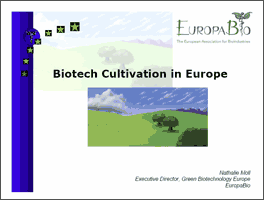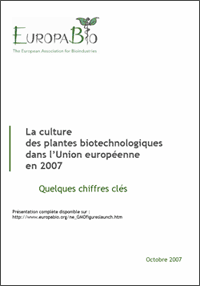Brussels, Belgium
October 29, 2007
 Today,
EuropaBio, the biotech
industry association, released figures on biotech crop
cultivation in Europe totaling 110 077 hectares in 7 EU Member
States representing a 77% increase over last year. The figures
show that the cultivated acreage in biotech crops has quadrupled
in France and more than doubled in the Czech Republic and
Germany. Spain, which is the largest cultivator of biotech crops
saw increases of more than 40% and this after 10 years of
cultivation of the same product. Today,
EuropaBio, the biotech
industry association, released figures on biotech crop
cultivation in Europe totaling 110 077 hectares in 7 EU Member
States representing a 77% increase over last year. The figures
show that the cultivated acreage in biotech crops has quadrupled
in France and more than doubled in the Czech Republic and
Germany. Spain, which is the largest cultivator of biotech crops
saw increases of more than 40% and this after 10 years of
cultivation of the same product.
To date, the only type of biotech crop grown in the EU is Bt
maize. Bt maize contains a gene that allows the maize to defend
itself against the European corn borer. An insect pest, the
European corn borer is present primarily in southern and middle
Europe, and is steadily making its way north.
These figures were released in advance of the Environment
Council meeting on October 30th which will discuss proposals on
GMO cultivation and import bans.
"We are delighted to see that the uptake of biotech crops is
growing despite the fact that only one product is available on
the European market" stated Johan Vanhemelrijck, Secretary
General of EuropaBio. He continued, "The cultivation of biotech
plants is legally possible in all EU countries and we strongly
urge policy makers in Europe to give all farmers the right to
choose the products which they think are best to protect their
crops and increase their competitiveness."
Biotech crops are a tool for farmers to fight disease, increase
yields and reduce the inputs needed to grow crops. Two hundred
and nine (209) biotech crops are under cultivation or
development in 46 countries around the world. And many of these
crops after being grown by non-EU farmers can be imported into
Europe and used as food or feed.
In Europe, farmers have the choice of only one maize product
which was already approved in 1998.
|
in
hectares |
2005 |
2006 |
2007 |
| Spain |
53,225 |
53,667 |
75,148 |
|
France |
492 |
5,000 |
21,174 |
| Czech
Republic |
150 |
1,290 |
5,000 |
|
Portugal |
750 |
1,250 |
4,500 |
| Germany |
400 |
950 |
2,685 |
|
Slovakia |
- |
30 |
900 |
| Romania |
111,000
(soybean) |
90,000
(soybean) |
350*
(maize) |
|
Poland |
- |
100 |
320* |
|
TOTAL |
. |
62,187 |
110,077 |
* to be confirmed by the
government
Biotech Cultivation in Europe:
http://www.europabio.org/GBE_media/GMOfigures/biotech_cultivation_Europe29102007.pdf
EuropaBio is the European Association for Bioindustries,
solely and uniquely bringing together bioscience companies from
all fields of research and development, testing, manufacturing
and distribution of biotechnology products. It has 85 corporate
members operating worldwide, 7 associate members, 5 BioRegions
and 25 national biotechnology associations representing some
1800 small and medium sized enterprises involved in research.
Europe : peu de
plantes autorisées mais des surfaces
en hausse
 Europabio, l’association
des industries des biotechnologies, a commenté les chiffres de
surfaces de plantes biotechnologiques cultivées en 2007 en
Europe. Elles totalisent environ 110 000 hectares dans sept pays
européens, soit une augmentation de 77% en un an. Les surfaces
ont quadruplé en France et plus que doublé en République tchèque
et en Allemagne. L’Espagne, premier producteur de plantes
biotechnologiques, a vu ses surfaces augmenter de plus de 40 %,
et ce, après 10 années de culture. Europabio, l’association
des industries des biotechnologies, a commenté les chiffres de
surfaces de plantes biotechnologiques cultivées en 2007 en
Europe. Elles totalisent environ 110 000 hectares dans sept pays
européens, soit une augmentation de 77% en un an. Les surfaces
ont quadruplé en France et plus que doublé en République tchèque
et en Allemagne. L’Espagne, premier producteur de plantes
biotechnologiques, a vu ses surfaces augmenter de plus de 40 %,
et ce, après 10 années de culture.
A ce jour, la seule plante génétiquement améliorée autorisée à
la culture en Europe est le maïs Bt. Ce maïs contient un gène
qui lui permet de s’auto protéger contre les insectes foreurs
(par exemple la pyrale). Ces ravageurs qui sont à l’origine de
dégâts importants dans l’Europe du Sud et du Centre s’étendent
progressivement vers le Nord de l’Europe. Cette plante est la
seule autorisée mais est disponible sous la forme de 50 variétés
inscrites au catalogue européen des semences et donc cultivables
dans l’ensemble des Etats-membres.
Ces chiffres sont annoncés en amont de la réunion du Conseil
Européen de l’environnement qui se tiendra le 30 octobre
prochain et qui abordera la question des cultures et de
possibles interdictions d’importation.
“Nous constatons avec satisfaction que les cultures
biotechnologiques sont en hausse, malgré le fait qu’une seule
transformation génétique sur une seule plante (maïs Bt) soit
autorisée sur le territoire européen » indique Johan
Vanhemelrijck, Secrétaire général d’Europabio. Il ajoute que «
la culture des plantes biotechnologiques autorisées est légale
dans tous les pays européens. Nous souhaitons que les autorités
européennes fassent en sorte que les agriculteurs aient le droit
de choisir la technologie qu’ils estiment être la meilleure pour
protéger leurs cultures et augmenter leur compétitivité ».
Deux cent neuf (209) plantes biotechnologiques sont disponibles
ou en cours de développement dans 46 pays. En Europe, les
agriculteurs n’ont qu’un seul choix possible pour la culture, le
maïs Bt dont l’autorisation date de 1998.
|
en
hectares |
2005 |
2006 |
2007 |
| Espagne |
53,225 |
53,667 |
75,148 |
|
France |
492 |
5,000 |
21,174 |
| République
Tchèque |
150 |
1,290 |
5,000 |
|
Portugal |
750 |
1,250 |
4,500 |
|
Allemagne |
400 |
950 |
2,685 |
|
Slovakie |
- |
30 |
900 |
| Roumanie |
111,000
(soja) |
90,000
(soja) |
350*
(maïs) |
|
Pologne |
- |
100 |
320* |
|
TOTAL |
. |
62,187 |
110,077 |
* à confirmer par le Gouvernement
Les principaux chiffres clés sont disponibles en français :
www.actu-ogm.fr
La présentation complète d’Europabio est disponible en anglais :
http://www.europabio.org/ne_GMOfigureslaunch.htm
|
Source: CORDIS
News
Massive rise in GM farming
still not enough, says Europe's biotech industry
Despite long-standing and recently more pronounced
scepticism of genetically modified organisms (GMOs),
the past 12 months have seen a massive 77% increase
in the area planted with genetically modified crops
in Europe. More than 1,000 square kilometres of GM
maize was harvested.
Presenting those figures on 29 October in Brussels,
EuropaBio, the association of European biotechnology
industries, called for a further increase in the
cultivation of GM maize, more specifically Bt maize,
as well as a speedier approval for other crops at
European level. According to EuropaBio, more than 60
crops are currently delayed in the EU approval
system or 'stuck in the backlog'.
'If it is clear from risk assessment that the
product is safe, then that product should nearly
automatically receive approval,' said Johann
Vanhemelrijck, secretary general of EuropaBio, in a
CORDIS News interview, calling on policy-makers to
base their decisions more reliably on scientific
research. 'Only then will companies continue to
invest in research. It is not possible to ask the
companies to contribute two-thirds to the 3% of the
Lisbon target for research if you do not allow the
products that result from this research [to be
commercialised],' he added.
Currently, the only GM crop approved for planting in
the EU is Bt corn, which is resistant to the corn
borer - a moth larva that eats the plant's stem and
ear, boring holes in the process that clear the way
for potentially toxic fungi to spread. Bt corn, a
variety of transgenic maize, has had its genome
modified to include a gene from the Bacillus
thuringiensis and produce a toxin which affects the
corn borer. Critics have warned, however, that the
modified maize variety also affects beneficial
insects.
Maize makes up about 14% of all the crops planted in
the European Union, meaning that 'maize matters',
Nathalie Moll, executive director of the Green
Biotechnology Europe (GBE) section of EuropaBio,
pointed out. Figures show that 1% of Europe's maize
is genetically modified today. According to
estimates, about 25% of EU maize is affected by the
European corn borer.
Eight countries in Europe currently allow the
cultivation of Bt maize. In France, for instance,
there has been a 323% increase of Bt maize plantings
from 5,000 hectares in 2006 to more than 21,000
hectares in 2007. French President Nicolas Sarkozy,
however, has just suspended all GM plantings until
next year, and he is not the only European head of
state to be wary of genetically engineered crops:
Austria, for instance, where no GM crops are grown,
has banned all imports of GM maize. EU environment
ministers are set to vote on 30 October on a
Commission proposal to force Austria to end its
national ban or safeguard clause.
Nevertheless, 'farmers in Europe must want it',
concluded Ms Moll, as 'a 77% increase in one year
shows that there is some interest', particularly
considering that Bt maize is not a recent
development but was first approved in the EU in
1998. According to Ms Moll, the use of Bt maize
increases competitiveness, helps cut down on CO2
emissions and is beneficial for consumers because it
reduces ingestion of the fungal toxins produced on
insect-damaged corn.
While critics have cast doubt on the apparent
benefits of GM crops for years, Dr Marc van
Montague, one of the pioneers of plant genetic
engineering, is sure that the higher yield provided
by GM crops will soon be needed in order to feed the
world's growing population and meet its energy
demands. Moreover, 'scientists have made many, many
more interesting constructs that could be important
to consumers, that could be important to the
environment and that could be important to
developing countries,' Dr van Montague told CORDIS
News. He cited drought-resistant crops as an
example. 'But if the economic structure is not
there, we cannot bring it to the market. Still, it
will be applied in some places of the world and the
rest will follow, because if farmers as well as the
industry see the effects, there is no way to stop
this science.' |
|
|